Don’t ask yourself IF you should work remotely from Thailand. Ask yourself why you aren’t doing it already! If you share our enthusiasm for the remote lifestyle, you probably don’t need much convincing to hit the road on your next adventure. And if that adventure is Thailand, we have practical advice and reliable info on where to stay as a remote worker in this epic country.
Where to move to in Thailand for remote workers and digital nomads?
- Koh Samui
- Koh Phangan
- Ko Tao
- Phuket
- Chiang Mai
- Pai
- Chiang Rai
- Bangkok
- Koh Chang
- Koh Mak
- Koh Kood
- Surat Thani
- Pattaya
- Koh Lanta
- Hua Hin
Those top 13 cities in Thailand for remote work stand out as the most loved destinations. Just bear in mind that Thailand has a lot more to offer beyond those listed, and it is well worth exploring once you’ve set your base.
What to expect in Thailand‘s most popular cities for remote work as a digital nomad?
Koh Samui
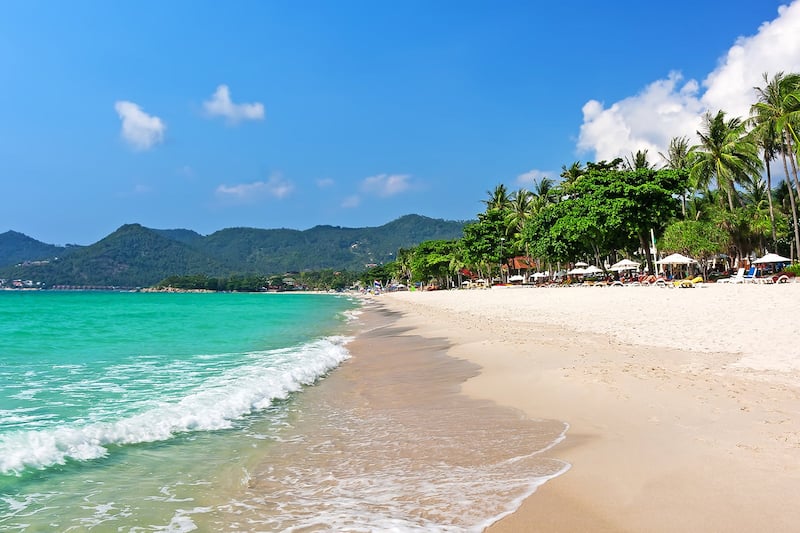
Koh Samui is an island located in the Gulf of Thailand that is known for its beautiful beaches, buzzing atmosphere and affordable cost of living. All of those factors make it a popular destination for remote workers. The island has a strong expat community, as well as an abundance of coworking spaces and cafes that offer stable WiFi for your laptop.
The island has tropical beauty, and it straddles the line between hoards of tourists in some areas of the island, and a more slower-paced rural vibe in others. It’s great for those who need daily western amenities and convenience, but still want to retreat to quiet beach villages on the weekends.
Koh Phangan
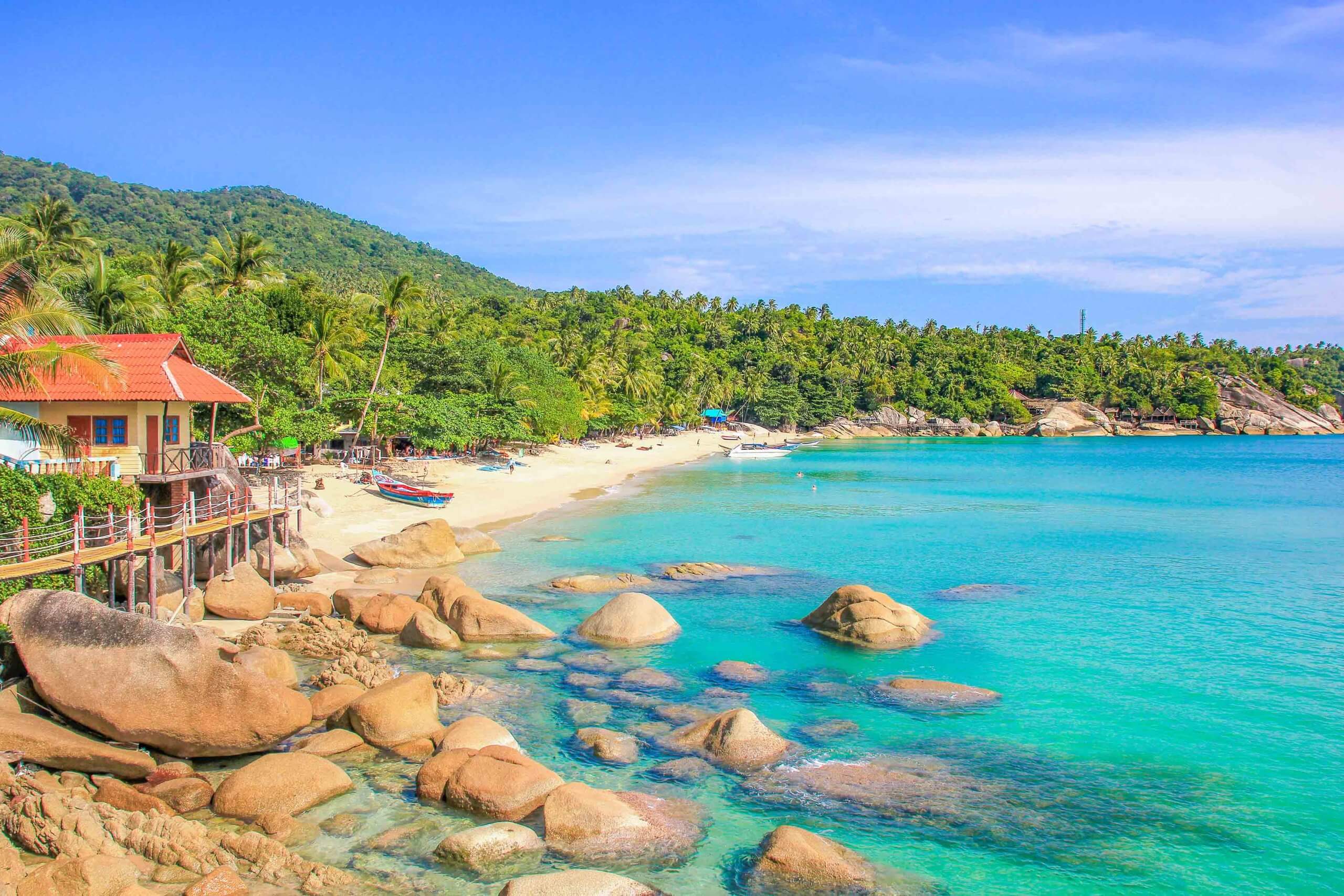
Right next to Koh Samui, this small island attracts remote workers with its electrifying community and an all-natural lifestyle. It has a great spiritual expat scene that caters to those that prioritize health consciousness. But of course, they still know how to party in the wild for 24 hours, making it the perfect lifestyle for many.
However, there are some things to consider when it comes to working remotely on Koh Phangan. The island is relatively small and remote, so it may not have the same level of infrastructure and amenities as larger cities. Unlike Samui, you can’t use Grab, Thailand’s version of Uber, and it can be harder to get around the island if you haven’t rented a bike or moped.
Furthermore, it can get crowded in the high season from the end of December to March. It has limited housing, making accommodation prices spike due to high demand for scarce quantities. That’s why it’s crucial to plan in advance and hold onto your home-away-from-home once you’ve found one! You can also expect a higher cost of living.
Nevertheless, it is well worth the extra effort for planning due to its magnetic aura, and a large, yet intimate, expat community. It is great for peace of mind, getting inspired or creating positive business connections.
Koh Tao

The smallest among our most popular islands in the Gulf of Thailand is Koh Tao. It is north of Samui and Phangan, and it enchants its residents with stunning beaches, rich underwater life and world renowned diving spots. Its great nature and easy-going locals will make you fall in love with the place.
The island is most popular for marine lovers: divers, explorers and snorkeling aficionados.
The cost of living is affordable, but it’s still a bit on the pricier side compared to Koh Samui or Bangkok.
Phuket

Phuket is an island located in the Andaman Sea in southern Thailand, and it’s one of the country’s most popular tourist destinations. The island has a rich culture and history, boasting many temples, shrines and historical sites for exploration. It also has a vibrant nightlife consisting of its famous pedestrian walking street, night markets and other attractions.
As a remote worker or digital nomad, you can find co-working spaces and cafes with good internet connectivity in Phuket. The island also has a growing community of digital nomads and remote workers, and there are several events and meetups organized for this community.
Chiang Mai
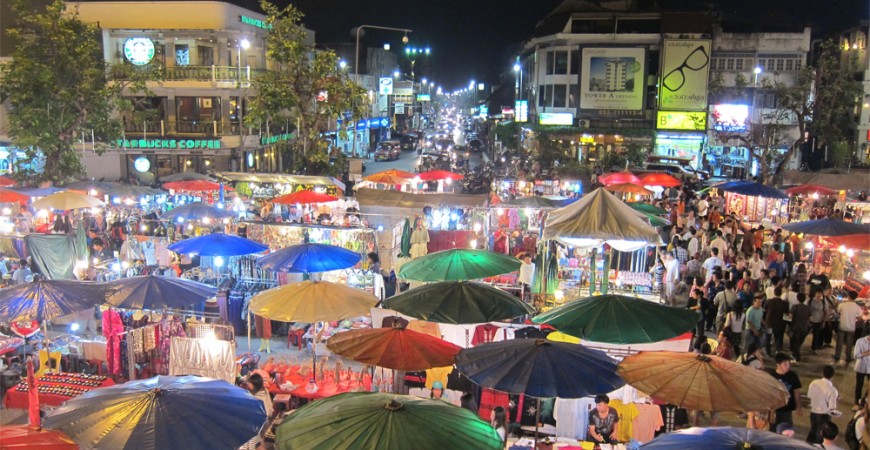
Chiang Mai is considered to be one of the founding fathers of the digital nomad lifestyle. It’s a land-locked city in the north of Thailand, so naturally it’s not known for any famous beaches. However it’s world renowned for its plethora of coworking spaces and cafes that cater to those nomads running online businesses, freelancing or working online. The city also has a vibrant and hip atmosphere, a lively arts and music scene, trendy cafes and restaurants, and a range of outdoor activities and cultural attractions.
Chiang Mai is also known for its friendly and welcoming community. There are many events and meetups organized for digital nomads and remote workers. Another benefit of Chiang Mai is that the cost of living is much lower compared to other major cities, making it an attractive destination for those looking to stretch their budget while working remotely.
Overall, Chiang Mai is a good destination for remote workers and hip people looking for an affordable and culturally rich place to live and work.
If you are on a budget, consider these cheapest cities in Thailand.
Pai
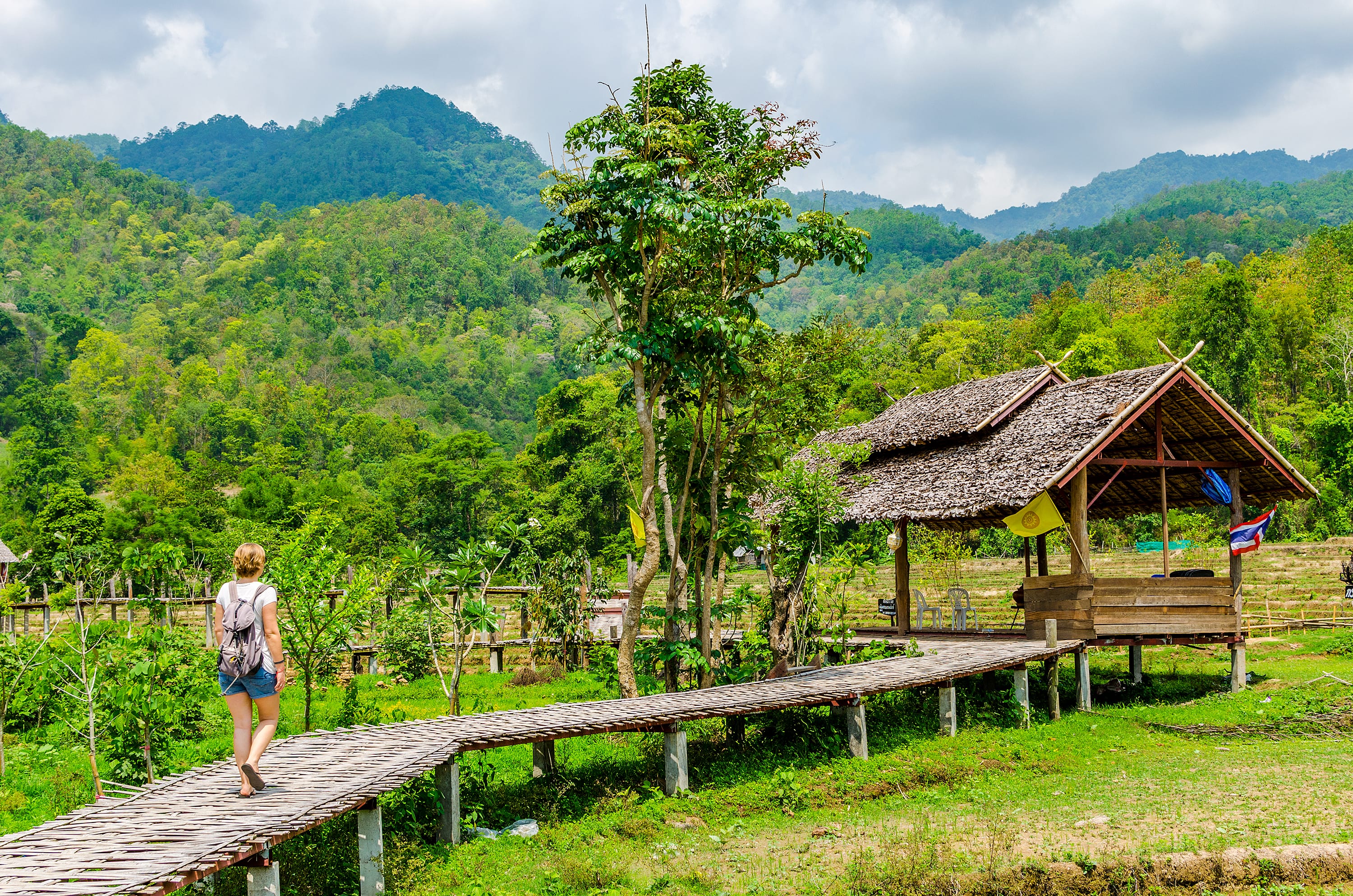
Pai is a town in the Mae Hong Son province of northern Thailand. It’s smaller in size, however it has a relaxing laid-back atmosphere and bohemian vibe. With a number of cafes, bars and restaurants catering to travelers, some call it the “hippie village.”
Pai is surrounded by stunning natural scenery consisting of rice paddies, waterfalls and forests. The town is also located close to several hill tribes and cultural attractions, making it a great base for those interested in experiencing the local culture. Pai is also known for its friendly and welcoming community, and there are many events and meetups organized for digital nomads and travelers.
It is worth noting that the internet connectivity in Pai might not be as reliable or fast as in other cities, so you may want to take this into consideration if you plan to work remotely from Pai.
Chiang Rai

Chiang Rai is another city in northern Thailand that is popular with digital nomads and remote workers. It has a thriving coworking scene, affordable cost of living and a vibrant culture. The city is surrounded by beautiful natural landscapes and it is close to several national parks and temples. It is also a gateway to neighboring Laos and Myanmar.
Bangkok

Bangkok is the capital and largest city in Thailand, and it is a popular tourist destination. One of the main pros of working remotely from Bangkok is its relatively low cost of living compared to other major cities. It is relatively easy to find affordable accommodation, food and transportation in Bangkok.
The city also has a vibrant culture, with a mix of modern and traditional influences.
There are many coworking spaces, cafes and other places to work from. The city is also well-connected with good internet infrastructure.
On the downside, Bangkok can be quite crowded and congested, and the air quality can be poor at times. It is also worth noting that the city has a relatively high crime rate compared to other parts of Thailand, but it’s still very safe compared to the major cities of the western hemisphere.
Koh Chang
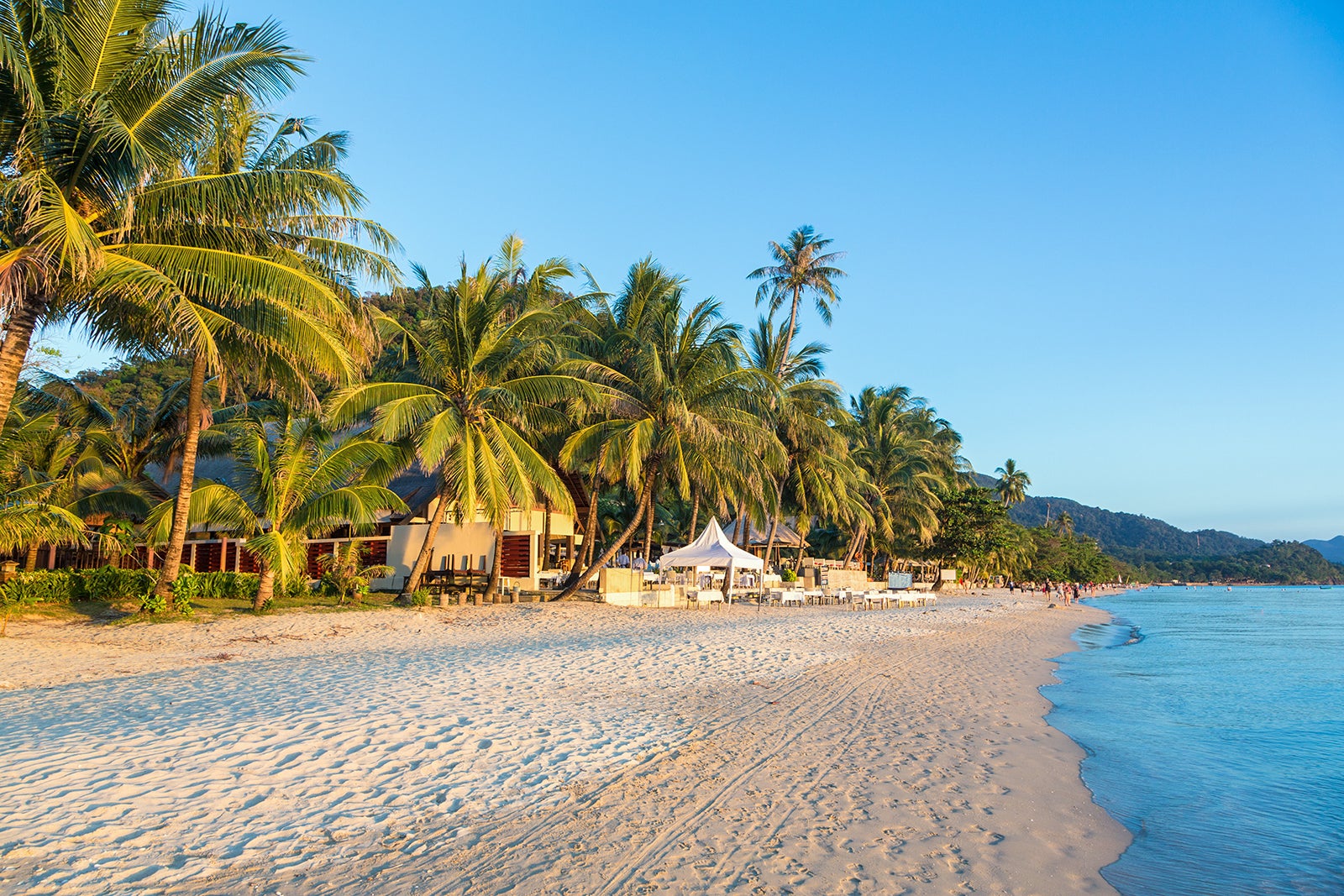
Koh Chang is an island located in the Gulf of Thailand. It’s known for its beautiful beaches, waterfalls and jungle forests. The island has a slower pace of life compared to other parts of Thailand.
Working remotely from Koh Chang can be a good option for those who are looking for a more relaxed, peaceful environment that’s not an oversaturated tourism hub. The island has a growing coworking scene, with several spaces offering fast internet and comfortable facilities. There are also a number of cafes and restaurants with WiFi that can be suitable for remote work. The cost of living on Koh Chang is generally lower than in other parts of Thailand, although it is worth noting that prices can be higher during peak tourism season.
One potential downside of working remotely from Koh Chang is that the island can feel isolated, and there may not be as many job opportunities or professional connections to make as there are in a larger city.
Koh Mak
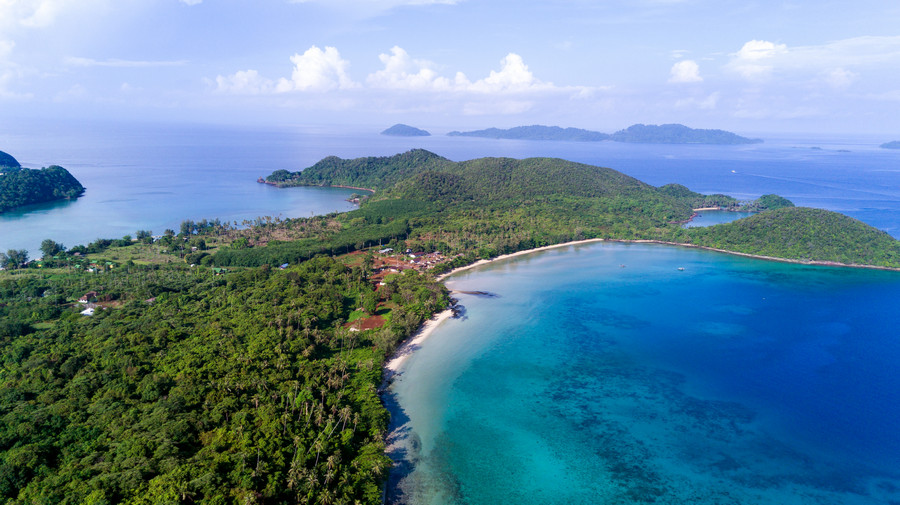
Koh Mak is an island close to Koh Chang. It is one of those “secret” destinations that many travelers have never even heard of. The island has a small native population and a relatively slow pace of life, making it a good option for those who are looking for a more serene atmosphere. However, it can become quite touristy at different points throughout the year.
Koh Kood (Ko Kut)
Koh Kut is yet another tiny island in the gulf of Thailand, and it is considered to be one of the most beautiful in the country. If you find a good wifi connection, or have reliable signal coverage from your mobile device, you can live your isolated dream life on this island.
Surat Thani
Surat Thani is not only a city in Thailand, but it’s also an entire region in the south that Samui and Phangan actually belong to. It’s truly a hidden gem near the Tapi river, although for many, it’s just an airport transfer hub for travelers on their way to those aforementioned islands. It boasts breathtaking natural sights and is a connecting point to the gulf islands. The city is very livable and has everything you’ll need as a remote worker in Thailand.
Pattaya

Pattaya is a popular tourist destination on the east coast of the Gulf of Thailand. It’s a city of extremes–on one end there is wild nightlife where anything goes, and on the other there are multiple revered temples for devotees. Let’s just say, you’ll never be bored here!
Koh Lanta
A list of the most popular cities for remote work would not be complete without Koh Lanta. It’s a small island, located just above the island of Krabi. Koh Lanta has a growing remote working community, including coworking and co-living spaces. The island is convenient for diving, and it’s famous for its limestone octopuses and many corals.
Hua Hin

In Thailand’s northern Malay Peninsula, the urban coastal city of Hua Hin has been the base for plenty of remote workers for many years. Its amazing community, beaches and proximity to Bangkok is why it continues to be a favorite among digital nomads.
What are the most popular cities in Thailand for remote workers?
Koh Phangan, Chiang Mai and Bangkok are the most popular cities in Thailand for digital nomads. While each of these destinations offer a different flavor, they all have the same high level of enjoyment and quality-of-life standards for remote living. Depending on your “vibe,” you’ll probably find that one of those three will suit your needs as a traveler and a remote worker more than the others. But if your heart is leaning towards one of the other destinations listed above, fear not, as Thailand generally has good internet and ever-increasing digital nomad communities all over the country.
Is the internet connection in Thailand good for working remotely?
Internet in Thailand is fairly stable. What can be the issue is occasional power outages on the islands. However, that usually gets resolved within an hour. Also, obtaining a local sim card with a long-lasting data plan is a nice back-up you should have to tether your laptop to your hotspot.
Does Thailand have a remote working/digital nomad visa?
Well, not really. There are options to stay long term while working remotely, and you can see if you qualify for any of them here.
One option is the so-called Long Term Residence Visa–a digital nomad visa that can grant you a stay of 10 years, while binding you to a 17% income tax.
What about paying taxes in Thailand as a remote worker or digital nomad?
The tax system in Thailand is quite complex. In order to always be in the clear, it is advised to seek assistance from a tax advisor or from the Thai Revenue Department. Until you do that, here is some basic orientational info, depending on which category you fall under:
0. Tax resident in Thailand
If you are married to a Thai national, are employed by a Thai company, have a work permit or stayed more than 180 consecutive days in the country, you are considered a resident.
- Residents earning income in Thailand
For tax residents who acquire their earnings in Thailand, tax is progressive. It is 0% for annual income up to 150,000 THB (Thai Baht), and increases up to 37% for annual income over 4 million THB.
- Non-residents earning income in Thailand
Just like for residents, if one is employed by a Thai company, it’s 0% for annual income up to 150,000 THB (Thai Baht), and increasing up to 37% for annual income over 4 million THB.
- Residents earning income outside of Thailand
No tax in most cases.
- Non-residents earning outside of Thailand
No tax in most cases.
Living in Thailand is for everyone. Even if you’re coming from the US there are easy ways to relocate!
Now that you have all the information you need to get started comfortably on your remote working adventure in Thailand, it’s on you to get the ticket and board the plane. Some say that’s the hardest step!
Are you in need of a remote job to relocate to Thailand?
Hesitating to travel because you don’t have a job that supports your nomadic lifestyle? Well, don’t miss out on your dream life. Instead, take matters into your own hands and get a remote job with us!
Like many of our contractors at Support Adventure, you too can work online while traveling abroad.
Applyfor one of our REMOTE positions today! We mostly have positions for remote IT help desk tech, service desk coordinator (dispatcher) and occasionally admin assistance.



0 Comments